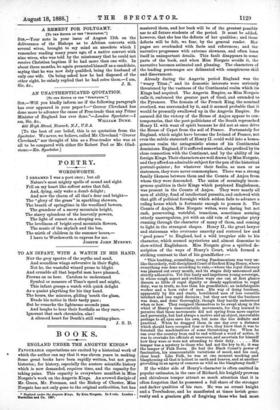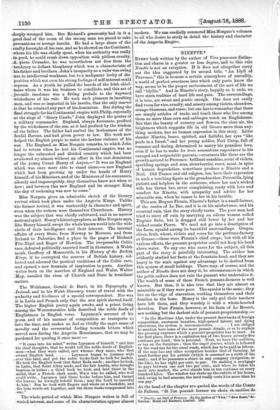BOOKS.
• England under the Angenn Yings. By Rate Norgate. In 2 vols. London : Macmillan and Co. 1287. • which the author can say that it was eleven years in making. Some great books have been rapidly written, but not great histories; for history, especially the austere scientific history which is now demanded, requires time, and the capacity for taking pains. This capacity is everywhere manifest in Miss Norgate's work on the Angevin Kings. An avowed disciple of Mr. Green, Mr. Freeman, and the Bishop of Chester, Miss Norgate has not only gone to the original authorities, but has
mastered them, and her book will be of the greatest possible use to all future students of the period. It must be added, however, that she has the defects of her qualities ; and these defects will be felt, we fear, by the general reader. Her pages are overloaded with facts and references ; and the narrative progresses with extreme slowness, and often loses itself in unimportant details. This fault disappears in some parts of the book, and when Miss Norgate avoids it, the narrative becomes animated and pleasing. The characters of the leading personages are delineated with conspicuous skill and discernment.
Already during the Angevin period England was the "weary Titan ;" and its domestic interests were seriously threatened by the vastness of the Continental realm which its Kings had acquired. The Angevin Empire, as Miss Norgate calls it, embraced the greater part of Gaul, and extended to the Pyrenees. The domain of the French King, the nominal overlord, was surrounded by it, and it seemed probable that it would be presently swallowed up in the Angevin Empire. So assured did the victory of the House of Anjou appear to con- temporaries, that the poet-politicians of the South reproached Henry II. with want of spirit because he did not at once drive the House of Capet from the soil of France. Fortunately for England, which might have become the Ireland of France, not even the subtle statecraft of Henry II. could weld into a homor geneous realm the antagonistic atoms of his Continental
dominions. England, if it suffered somewhat, also profited by its close connection with the Continent, and by the ability of its foreign Kings. Their characters are well drawn by Miss Norgate, and they afford an admirable subject for the pen of the historical portrait-painter ; for whatever their faults, as men or as statesmen, they were never commonplace. There was a strong
family likeness between them and the Counts of Anjou from whom they were descended. The union of seemingly incon- gruous qualities in their Kings which perplexed Englishmen, was present in the Counts of Anjou. They were nearly all men of ability, fond of intellectual pursuits, and endowed with that gift of political foresight which seldom fails to advance a ruling house which is fortunate enough to possess it. The Counts of Anjou, Miss Norgate writes, were daring but not rash, persevering, watchful, tenacious, sometimes seeming utterly unscrupulous, yet with an odd vein of irregular piety running through the character of many of them, and coming to light in the strangest shapes. Henry II., the great lawyer and statesman who overcame anarchy and restored law and.
"good peace" to England, had a wild irregular side to his character, which seemed mysterious and almost demoniac to slow-witted Englishmen. Miss Norgate gives a spirited de- scription of the ways of Henry's Court, which formed a striking contrast to that of his grandfather :— "This bustling, scrambling, roving Pandemonium was very un- like the orderly, well-disciplined Court of the first King Henry, where everything was done according to rule,—where the royal itinerary was planned out every month, and its stages duly announced and strictly adhered to. Yet this hasty and impetuous young sovereign, in whose rough aspect and reckless ways one can at first glance discern so little of regal dignity or steady application to regal duty, was in truth, no less than his grandfather, an indefatigable worker and a born ruler of men. His way of doing business, apparently by fits and starts, bewildered men of less versatile intellect and less rapid decision ; but they saw that the business was done, and done thoroughly, though they hardly understood when or how. They resigned themselves to be swept along in the whirl of Henry's unaccountable movements, for they learned to perceive that those movements did not spring from mere caprice and perversity, but had always a motive and an object, inscrutable perhaps to all eyes save his own, but none the less definite and practical. When he dragged them in one day over a distance which should have occupied four or five, they knew that it was to forestall the machinations of some threatening foe. When he ran over the country from end to end without a word of notice, it was to overtake his officials at unawares, and ascertain for himself how they were or were not attending to their duty His temper was a mystery to those who had not the key to it ; it was the temper of Fulk Nerra. He had the Black Count's power of fascination, his unaccountable variations of mood, and his cool, clear head. Like Fulk, he was at one moment mocking and blaspheming all that is holiest in earth and heaven, and at another grovelling in an agony of remorse as wild as the blasphemy itself."
If the wilder side of Henry's character is often omitted in popular estimates, in the case of Richard, his knightly prowess and chivalrous temper attract so much attention that it is often forgotten that he possessed a full share of the stronger and darker qualities of his race. He was an errant knight and a Troubadour, and he manifested at times lavish gene- rosity and a gracious gift of forgiving those who had most. deeply wronged him. But Richard's generosity had in it a good deal of the scorn of the strong man too proud to take
precautions or avenge insults. He had a large share of the crafty foresight of his race, and as he showed on the Continent, where his life was chiefly spent, when his authority was really in peril, he could crush down opposition with pitiless cruelty. A pious Crusader, he was nevertheless not free from the tendency to defiant blasphemy which was a characteristic of his father and brothers. John's incapacity as a ruler was owing not to intellectual weakness, but to a malignant levity of dis- position which not even his strong feelings of self-interest could repress. As a youth he pulled the beards of the Irish chief- tains whom it was his business to conciliate, and. this act of juvenile insolence was a fitting prelude to the wayward wickedness of his rule. He took such pleasure in insulting men, and was so impartial in his insults, that the only marvel is that he retained any part of his dominions. But during the final straggle for his Continental empire with Philip, especially at the siege of "Saucy Castle," John displayed the genius of a military commander. England, always fortunate, profited by the wickedness of the son, as it had profited by the wisdom of the father. The father had curbed the lawlessness of the feudal Barons, and had given power to law. His work now helped the English people to resist the lawless violence of his son. The England, as Miss Norgate remarks, to which John had to return when he lost his Continental empire, was no longer the exhausted and divided country which had been swallowed up almost without an effort in the vast dominions of the young Count Henry of Anjou—" It was an England which was once more able to stand alone,—.a new England which had been growing up under the hands of Henry himself, of his Ministers, and of the Ministers of his successors, silently and imperceptibly,.they themselves knew not when or • how ; and between this new England and its stranger King the day of reckoning was now to come."
Miss Norgate gives an admirable sketch of the literary revival which took place under the Angevin Kings. Unlike the former revival, it was unchurchly in character and spirit, oven when the writers were themselves Churchmen. History was the subject that was chiefly cultivated, and in no narrow _ national spirit. Henry's historiographers, as Miss Norgate says, like Henry himself, swept the whole known world into the wide circle of their intelligence and their interest. The internal affairs of every State, from Norway to Morocco, and from Ireland to Palestine, find a place in the pages of Richard Fitz-Nigel and Roger of Howden. The irrepressible Celtic race, defeated politically, asserted itself in literature. A Welsh monk, Geoffrey of Monmouth, in his History of the British Kings, if he corrupted the sources of British history, col- lected and adorned the poetical traditions of the Celtic race, and opened a new fountain of inspiration to poets. Another writer born on the marches of England and Wales, Walter
'Map, assailed the vices of Church and state in trenchant satires.
The Welshman, Gerald de Barii, in his Topography of Ireland, and in his Welsh Itinerary, wrote of travel with the audacity and liveliness of a special correspondent. Nor was it in Latin and French only that the new spirit showed itself.
The higher English poetry again awoke, and a priest living )among the Worcestershire hills described the noble deeds of Englishmen in English verse. Layamon's account of his poem and of his manner of composition so transports us into the time, and makes us feel so vividly the eager sense of novelty and the reverential feeling towards letters which moved men during the Angevin Renaissance, that we may be pardoned for quoting it once more :--
" It came into his mind," writes Layamon of himself, "and into his chief thoughts, that he would tell the noble deeds of English- men—what they were called, and whence they came, who first owned English land Layamon began to journey wide . over this land, and got the noble books that he took for models. He took the English book that Saint Beds made ; another he took, in Latin, that Saint Albin made, and the fair Austin, who brought baptism in hither' a third book he took, and laid there in the midst, that a French clerk made, Waco was he called, who well could write. Layamon laid these books before him, and turned the leaves; he lovingly beheld them ; may the Lord be merciful
to him ! Pen he took with fingers and wrote on a bookskin, and
the true words set together, and the three books-compressed into one."
The whole period of which Miss Norgate writes is full of varied interest, and some of its characteristics appear almost
modern. We can cordially commend Miss Norgate's volumes to all who desire to study in detail the history and character of the Angevin Empire.



































 Previous page
Previous page